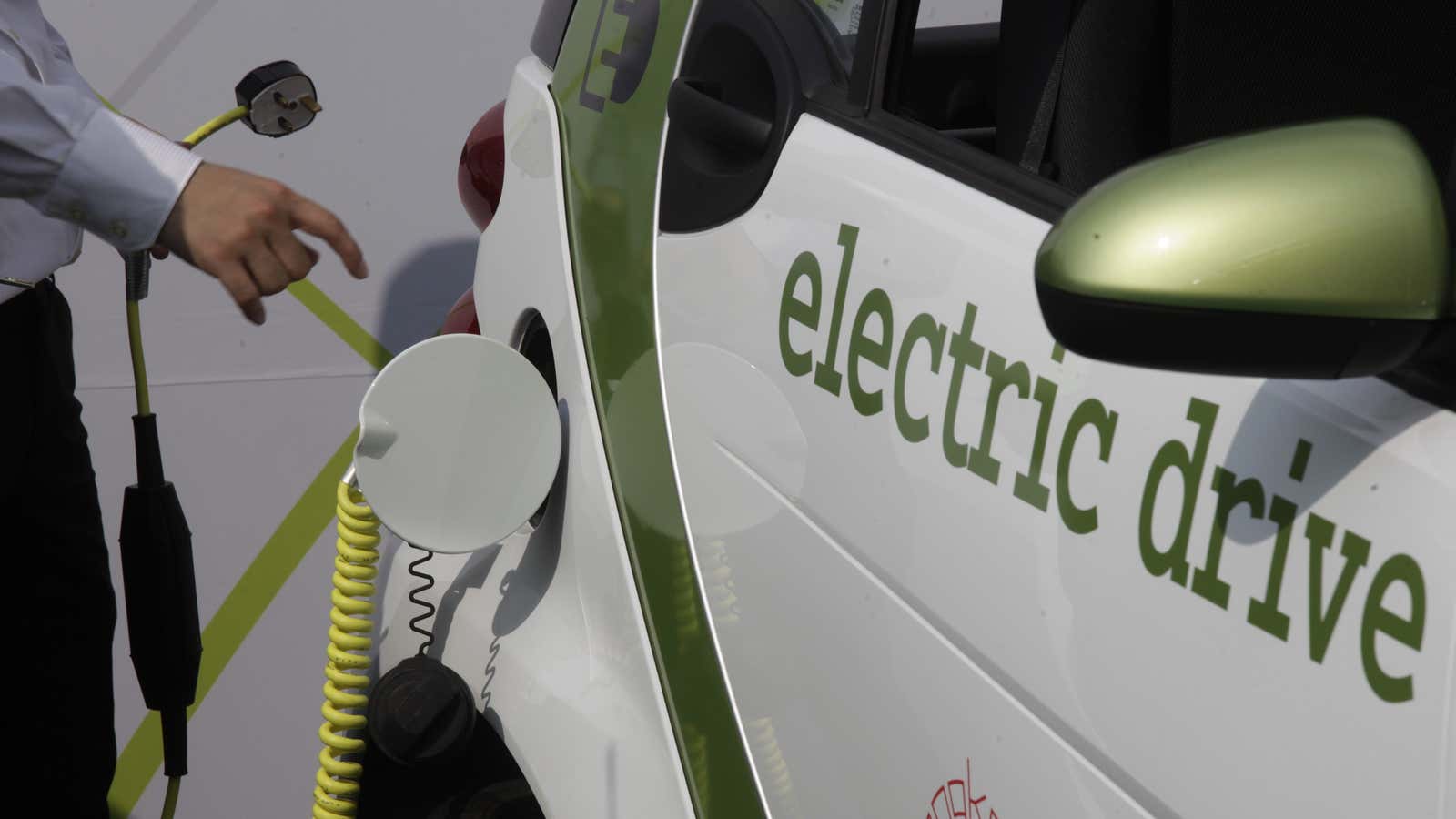Nine years ago this week, as stocks were tanking in the global financial recession, Warren Buffett put money into a little-known mobile phone battery maker in Shenzhen. This year, with China making it clearer than ever that fossil-fuel cars aren’t going to be welcome for long, that bet is doing better than it’s done in a while.
On Sept. 27, 2008, MidAmerican Energy, controlled by Buffett’s holding company Berkshire Hathaway, announced it was putting $230 million (paywall) into China’s BYD, paying about HK$8 a share (a little over US$1). Back then, BYD, which started out in 1995, was just on the verge of getting into selling electric vehicles. It’s now China’s biggest seller of electric vehicles and saw its stock price increase nearly 60% this year, sending the value of MidAmerican Energy’s stake to about $1.9 billion as of Monday’s closing price. Those gains came despite a substantial slowdown in sales and decline in profit after China cut back on electric vehicle subsidies.
Since BYD hit a record high of HK$88.4 in Oct. 2009 and then gave up those gains, the stock hasn’t come close to revisiting those levels till this month, when a top industry ministry official said Sept. 9 at an auto conference that China too would phase out all sales of fossil-fuel cars, following similar announcements from France, UK, and India. A formal time-table for the fossil-fuel-powered vehicle ban has not been given.
Since those comments were made, BYD stock soared more than 50% through Thursday (Sept. 21), before giving up some of those gains since. The company has sold over 25,000 electric and hybrid passenger vehicle models—a nearly 20% share of the market—as of July, according to the latest data from China Passenger Car Association(CPCA) (link in Chinese), a Shanghai-based vehicle research group.
Beijing-based BAIC Motor, whose group sales make it the second-biggest seller of electric vehicles after BYD, hasn’t been so fortunate. Things might look different if its subsidiary Beijing Electric Vehicle, or BJEV, which generated 19,675 in new energy passenger vehicle sales through July, were listed. That strength, however, has been offset by other woes, including troubles from BAIC’s joint-venture with South Korea’s Hyundai, after China’s anger at the deployment of an anti-missile shield in South Korea resulted in trade and consumer retaliation.
China, which is investing heavily in renewable energy, has already made more headway in the adoption of electric cars than any country, helped by government subsidies. In 2016, it sold half a million (link in Chinese) “new energy vehicles,” or NEVs, which includes both full battery and hybrid models, and plans to sell 2 million of them in 2020. Through August this year, the latest data available, China has sold about 320,000, about 80% of them fully electric models. Passenger vehicle sales are a subset of these sales.
According to a July report by global consulting company McKinsey, in 2016 alone, about 25 new electric vehicles (EV) models entered the Chinese market, bringing the total to 75 EV models, more than any other country, it said.
In June, China issued draft regulations requiring electric car sales to make up a quota of each company’s sales. BYD’s chairman Wang Chuanfu said last week he expects the country’s vehicles to be “fully electrified” by 2030, but analysts and industry members argued Wang’s remarks were unrealistic and aimed at lobbying the government because of the company’s heavy bet on electric cars.
There is another company whose stock has done even better than BYD’s—with far fewer electric vehicle sales.
Geely, the Zhejiang-based automobile manufacturer that bought Sweden’s Volvo, has seen its stock soar thanks to its remarkable overall sales growth. Its existing new energy passenger vehicle sales, though, were only around 7,000 this year, according to CPCA data. But it’s announced ambitions to do much more.
Overseas, it plans to electrify London taxis, after having bought the iconic black cab company. And it has said it wants new energy vehicles to make up around 90% of its sales by 2020. The Hong Kong-listed group saw a 24% stock price jump through Sept. 21 since the phase-out news, and then retreated. For the year, it’s up more than 200%.
Still, there are at least a couple of things on the horizon that might curb enthusiasm, and Monday’s trading showed investors pulling back on both BYD and Geely. For one thing, China has announced that it will end monetary incentives (link in Chinese), currently worth about a quarter of the price of a midsize vehicle, for electric car purchases by 2020.
